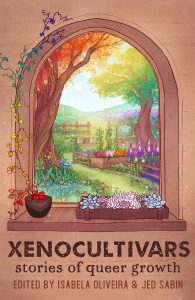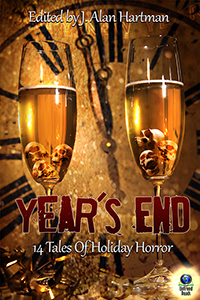Xenocultivars: Stories of Queer Growth ~ Edited by Isabela Oliveira and Jed Sabin
Publisher: Speculatively Queer
Genre: Sci-Fi/Fantasy, LGBTQ, Anthology
Rating: 4 Stars
Reviewed by AstilbeThis collection of speculative short fiction is about all kinds of queer growth, from emerging and developing to flourishing and cultivating. Whether they’re tender sprouts just beginning to discover themselves or deeply rooted leaders fiercely defending those they love, the people in these stories have this in common: you can’t tell them what to do. They grow as they please.
The magic of plants is undeniable.
“The Thing About the Jack-o’-Lanterns” showed what happened when the main character carved a jack-o-lantern every year and spoke to the dead through it. This was a unique tradition that I was eager to learn more about, especially once the protagonist revealed that she was attracted to women and had no idea how to share that news with her mother. What an endearing and wholesome this protagonist was! I couldn’t wait to find out how she’d resolve her conflict. While the final scene did provide satisfactory answers, it also left me hoping that the author will write a sequel to it soon. This wasn’t a world I wanted to leave quite as quickly as I did.
Lumberjacks and the natural world don’t go well together at all in my opinion, so “A Lumberjack’s Guide to Dryad Spotting” made me extraordinarily curious to see how the author was planning to mix those ideas into one coherent storyline. There was something incredibly likeable about the main character from the opening scene even though I shuddered at the thought of him chopping down a Dryad to make himself rich. If only this tale had been developed more thoroughly by Mr. Payseur. The first few scenes were well done, but then it petered out just when I was expecting it to pick up the pace. This was one of the few disappointments in this collection, and even then, I’m still glad I read it. The imagery in it was so crisp and original even if the plot itself didn’t quite work for me.
Midwestern culture can be a delightful jumble of contractions, many of which were captured perfectly in “How to Make a Spell Jar.” Ash lived in a small town where everyone knew everyone else’s business which meant keeping a secret was nearly impossible. I smiled at how well the author captured both the benefits and drawbacks of living somewhere like that, and I laughed out loud when they informed the audience that Midwesterners all “live to be ninety-six out of sheer unwillingness to acknowledge the tattered specter of death.” Not only did lines like that one capture this culture perfectly, they gave the audience ample opportunities to get to know Ash as a character as she attempted to navigate them. Mx. Crawley did a wonderful job of explaining all of this, and I look forward to reading more from them.
Xenocultivars: Stories of Queer Growth made me yearn for spring.

































